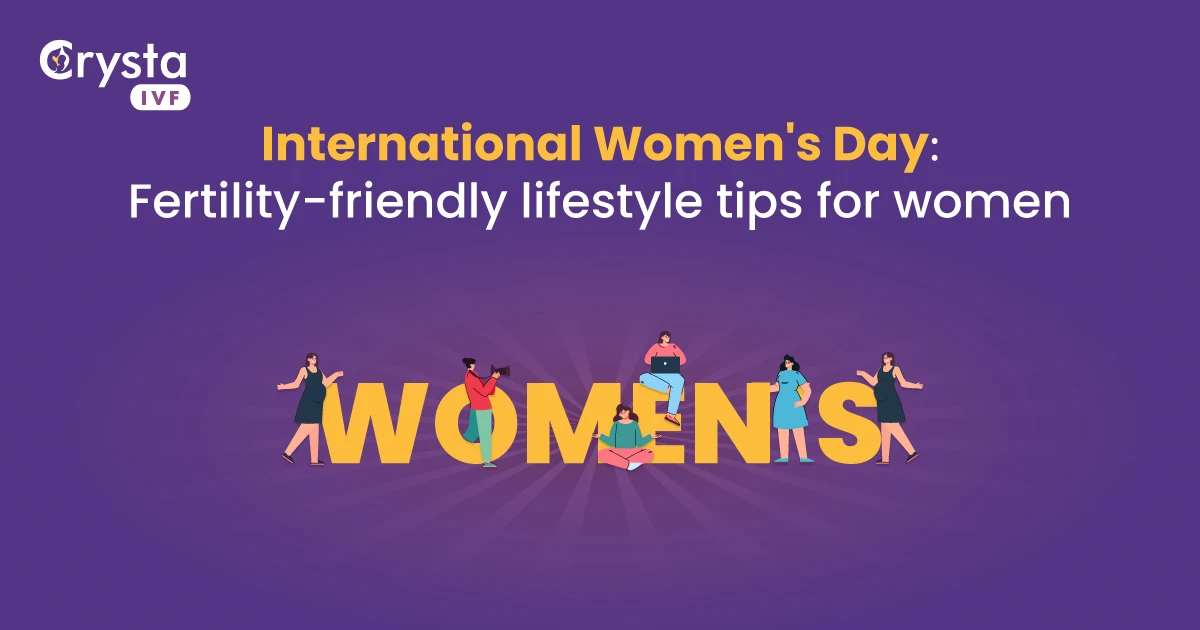On this International Women’s Day, let’s celebrate women’s strength, resilience and diversity worldwide. Did you know that fertility affects 15% of couples? The road to parenthood is challenging, but you are not alone in this challenge. Whether you’re actively trying to conceive or simply considering future family planning, you can improve your reproductive health by following the fertility lifestyle tips. Here in this blog, let’s explore the practical tips to empower women to prioritize their fertility and overall health.
What causes fertility problems in women?
Fertility problems in women can be caused by various factors. Here are the common causes-
- Hormonal Imbalances- Conditions like polycystic ovary syndrome (PCOS), thyroid problems, and imbalances in estrogen and progesterone can disrupt ovulation.
- Age- As women age, their egg quantity and quality naturally decline, making ovulation less frequent or even absent.
- Overweight or underweight- Both obesity and being underweight can affect ovulation due to hormonal imbalances.
- Blocked Fallopian Tubes- Blockages from scar tissue or endometriosis can block eggs from travelling to the uterus or sperm from reaching the egg.
- Uterine Fibroids or Polyps- These benign growths can interfere with the implantation of a fertilized egg.
- Cervical Mucus Issues- Thick or hostile cervical mucus can hinder sperm from reaching the egg.
- Endometriosis- Tissue similar to the uterine lining grows outside the uterus, which can cause inflammation and impact fertility.
- STIs- STIs like chlamydia can damage fallopian tubes and can cause infertility.
- Lifestyle Habits- Smoking, excessive alcohol consumption, and drug use can negatively affect egg quality and overall health.
There can be multiple reasons for infertility; if you are concerned about your fertility, consult the best professional for a thorough evaluation and treatment options.
7 Fertility Tips that Every Woman Must Follow
No one-size-fits-all approach to fertility. But there are some lifestyle tips following which you can ensure better reproductive health and fertility. Let’s have a look at some of these tips-
Nourish your body
Your diet is fuel for your body, and what you eat impacts your reproductive health. Nutrient deficiencies can disrupt hormone balance, menstrual cycles, and ovulation, affecting fertility. Focus on a balanced diet rich in fruits, vegetables, and whole grains. Don’t forget healthy fats like avocados and nuts and lean protein sources like fish and legumes. Eat lots of fruits in your diet rich in antioxidants, vitamins and minerals, such as leafy green, berries, and citrus fruits, to ensure you’re getting a variety of essential nutrients.
Maintain a healthy weight.
Being underweight or overweight can affect hormonal balance and menstrual regularity, PCOS and can impact fertility. Both underweight and overweight women may experience difficulties with fertility treatment and have higher rates of pregnancy complications. Strive to maintain a healthy weight through a balanced diet and regular exercise. Keep track of your food intake, physical activity, and weight regularly to assess progress and make adjustments as needed.
Get enough sleep
Try to get 7-8 hours of quality sleep each night. When you rest well, your body functions optimally, including hormone regulation. Avoid distractions, such as electronic devices, to get good sleep. Make a sleep routine to ensure you have a good night’s sleep.
Take multivitamins
Many women have low vitamin levels that may affect fertility. These multivitamins are essential to produce healthy eggs and support a healthy pregnancy. Consult your doctor before adding a new supplement or multivitamin, and consider taking multivitamins like calcium, iron, vitamin D, Vit B12, omega-4 fatty acids, zinc, folic acid and more.
Prioritize Exercise
Moving your body helps you manage your weight, reduces stress, and promotes reproductive health. Give yourself an aim to exercise at least 30 minutes a day. Start with moderate exercises such as walking, cycling, swimming, or yoga.
Manage stress
Stress can impact your hormones, impacting ovulation and overall health. High-stress hormones, such as cortisol, can interfere with the production of reproductive hormones like estrogen and progesterone, leading to irregular menstrual cycles or ovulatory dysfunction. High levels of stress may also cause infertility, miscarriage, and menstrual disorders. Find healthy ways to manage stress, like yoga, meditation and spending time in activities that calm your mind.
Schedule regular health checkups.
Regular health checkups are essential to monitor reproductive health and detect hidden issues early. Connect with an expert; based on symptoms and medical conditions, your healthcare provider can recommend health checkups. Routine check-ups allow for the early detection and management of conditions that may affect reproductive health, such as PCOS, endometriosis, or STIs.
What is the importance of female fertility health?
All women, regardless of background, ethnicity, sexual orientation, or disability, deserve access to quality reproductive healthcare. Studies show that investing in women’s reproductive health leads to economic benefits for both individuals and societies. Healthy women are more likely to participate in the workforce, contribute to the economy, and raise healthy children. Conversely, lack of access to reproductive care can lead to unintended pregnancies, unsafe abortions, and increased healthcare costs. When all women have access to comprehensive reproductive healthcare services, including preventive care, screenings, and treatment options, it leads to better health outcomes for both women and their children. However, early detection and management of reproductive health issues can prevent complications. Women’s experiences with fertility and reproductive health are diverse.
Nurturing Women’s Reproductive Health: Final Thoughts
This women’s day takes charge of your fertility health and prioritizes your reproductive health. By following the above-mentioned fertility-friendly lifestyle with nutrition, exercise, stress management, sleep hygiene, weight management, and regular healthcare check-ups, women can optimize their chances. Women, you are strong, capable, and deserving of the best possible care – every step of the way.
Read more blogs:
- How to Improve Egg Quality Naturally?
- How to Increase AMH Levels Naturally?
- How to Avoid Miscarriage with PCOS?
- What is PCOD: Everything You Need to Know?




